The Nursing Home Law Center is committed to providing the legal resources necessary to hold negligent facilities accountable.
Sexual Abuse in Nursing Homes
Experienced Nursing Home Sexual Abuse Law Firm
Sexual nursing home abuse is an alarming and underreported problem that affects some of the most vulnerable members of society—elderly residents who depend on caregivers for their daily needs.
Elderly sexual abuse in nursing homes is an insidious crime that can go unnoticed due to various risk factors. Cognitive impairment (such as Alzheimer’s disease), fear, or an inability to communicate the abuse often prevent victims from coming forward. As a result, care professionals and loved ones may be unaware of the abuse until it’s too late.
Recognizing the warning signs of elder mistreatment, understanding the legal implications, and knowing how a nursing home abuse lawyer can help are all critical steps in protecting vulnerable residents.
Nursing Home Sexual Abuse Settlements We’ve Secured for Victims
When care facilities fail to protect nursing home residents, including vulnerable and older adults, legal action can hold them accountable. Our legal team has successfully secured settlements for victims of sexual abuse, helping families find justice and financial compensation for the harm suffered. Some of the settlements we’ve secured include:
- $2,333,000 Settlement – Awarded to two older adults who were sexually assaulted by a certified nursing assistant (CNA).
- $810,000 Settlement – Secured for a dementia patient who was sexually assaulted by a maintenance worker at a residential home.
- Eight-Figure Confidential Settlement – Awarded to a physically disabled woman who was sexually assaulted by a maintenance worker.
These cases highlight the devastating impact of sexual abuse in nursing homes and the legal recourse available to victims and their families. If you suspect abuse, taking immediate action can prevent further physical and psychological harm and help secure justice for your loved one.
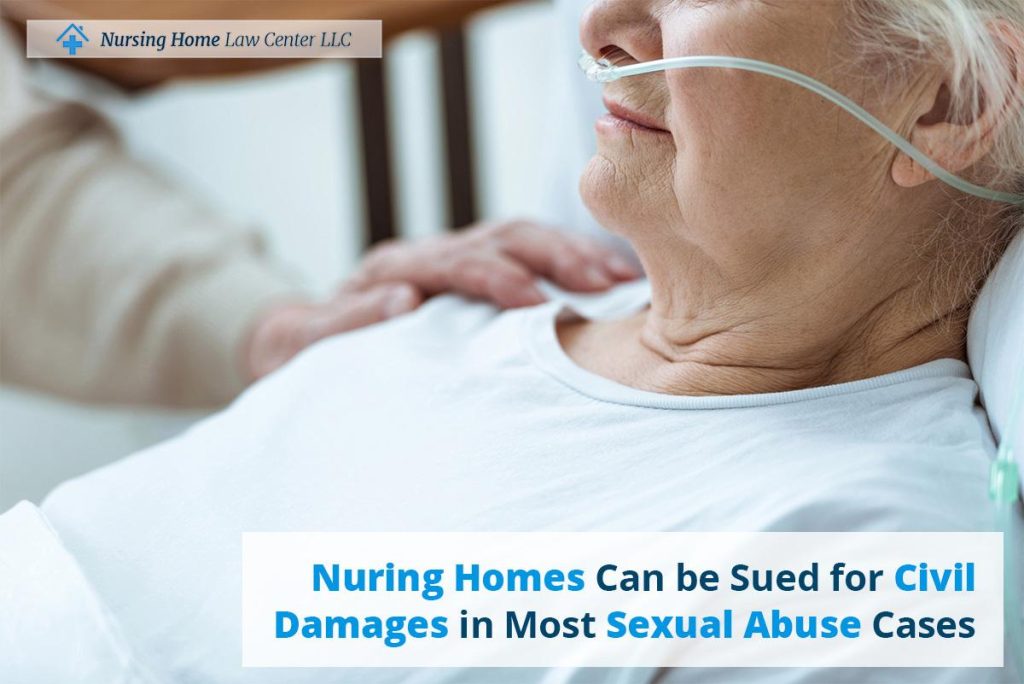
Understanding Sexual Abuse in Nursing Homes
Elder sexual abuse in nursing homes refers to any form of non-consensual sexual contact, unwanted touching, or behavior that occurs in a long-term care facility.
Sadly, those who are responsible for the care and protection of older adults in residential homes—such as caregivers, staff members, and even other residents—can sometimes become the perpetrators of such abuse.
Sexual abuse can be devastating to the physical and emotional well-being of older adults. Many older adults already suffer from physical disabilities, cognitive impairments like dementia, or emotional trauma, risk factors that make them easy targets for abuse in nursing homes.
For older adults, the inability to communicate effectively and the isolation they often face only heighten their vulnerability. As a result, reported sexual abuse from the residents themselves can be rare. For caregivers and family members, it’s critical to be vigilant to signs of elder sexual abuse to protect nursing home residents and hold the perpetrators accountable.
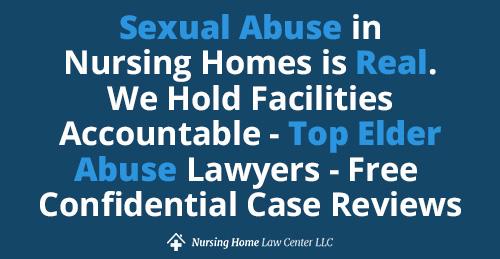
Forms of Sexual Abuse
Sexual abuse in nursing homes can take several forms, and understanding the legal definitions is essential for identifying when abuse has occurred. Sexual nursing home abuse includes:
- Non-consensual sexual contact: This includes any form of touching or groping of the victim’s body that is sexual and occurs without the resident’s consent.
- Sexual assault: This refers to forced or coerced sexual intercourse or other sexual acts.
- Sexual harassment: Unwanted sexual advances, comments, or behaviors that create a hostile or uncomfortable environment for the resident.
- Inappropriate exposure: Forcing a resident to view sexual acts or inappropriate nudity against their will.
Each of these forms of abuse is not only morally reprehensible but also illegal. Victims of elder abuse deserve justice, and legal avenues are available to seek compensation and ensure that the abuser and the facility responsible are held accountable.
Signs and Symptoms of Sexual Abuse
Identifying elder sexual abuse in a nursing home setting can be difficult, especially when physical or cognitive impairments prevent the victim from clearly communicating the abuse. However, family members and loved ones should remain vigilant for signs that could indicate sexual abuse is occurring.
Some of the common signs and symptoms of sexual abuse in nursing homes include unexplained injuries, such as bruises or scratches, sexually transmitted infections, blood-stained or torn clothing, discomfort or pain when sitting or moving, and a fear of being touched.
Risk Factors for Elder Sexual Abuse
Elder sexual abuse often goes unreported due to a combination of vulnerability, power imbalances, and systemic failures within care facilities. The following risk factors increase the likelihood of sexual abuse in older adults, making it crucial for families and caregivers to remain vigilant.
- Cognitive Impairment and Communication Barriers: Residents with dementia, Alzheimer’s, or other cognitive impairments may struggle to recognize abuse or communicate what has happened.
- Understaffing and Inadequate Supervision: Care homes that are understaffed or poorly managed often lack proper oversight, allowing abuse to occur unnoticed. Overworked caregivers may also fail to recognize or report red flags, while background checks on employees may be rushed or incomplete.
- Isolation of Residents: Elderly residents who have few visitors or no close family involvement are at higher risk of sexual abuse. Abusers often target those who lack external support, knowing there is a lower chance of discovery.
- Power Imbalances and Caregiver Dependency: Many care home residents rely entirely on caregivers for basic needs, including bathing, dressing, and medical care. This dependency creates an imbalance of power, making it easier for abusers to manipulate or control their victims.
- Poor Facility Policies and Lack of Training: Facilities without strict abuse prevention policies, staff training, and reporting procedures increase the risk of sexual abuse. If a residential home fails to enforce safeguards or ignores warning signs, residents remain vulnerable to harm.
- Failure to Investigate or Report Abuse: Some cases of elder sexual abuse go unpunished due to a culture of silence within facilities. Staff members may fear retaliation for speaking out, or administrators may attempt to cover up incidents to avoid legal consequences and damage to the facility’s reputation.
How to Report Nursing Home Sexual Abuse
- National Adult Protective Services Association (NAPSA) – Report abuse through the National Adult Protective Services hotline or contact the local APS office in your state.
- National Center on Elder Abuse (NCEA) – Provides resources and state-specific reporting contacts.
- Local Law Enforcement – Report the abuse to the police or sheriff’s department. In cases of sexual assault, law enforcement may initiate a forensic investigation.
- Long-Term Care Ombudsman Program – Advocates for care home residents’ rights and investigates abuse reports. Find your state’s ombudsman at the National Consumer Voice for Quality Long-Term Care.
- U.S. Department of Health and Human Services (HHS) – Office for Civil Rights (OCR) – If abuse involves violations of federal rights or Medicare/Medicaid standards, file a complaint with HHS OCR.
- Nursing Home Corporate Office – If the facility is part of a larger chain, filing a report with the corporate compliance office may trigger an internal investigation.
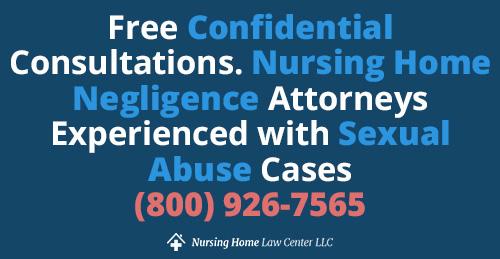
The Role of a Lawyer in Nursing Home Sexual Abuse Claims
When dealing with reported sexual abuse, the guidance and expertise of an experienced lawyer are invaluable. These cases can be emotionally draining for the concerned parties, especially when the victim is elderly, has health or cognitive impairments, or other risk factors that make them vulnerable.
A lawyer who specializes in nursing home resident sexual abuse cases will help you through every stage of the process. Their role includes collecting evidence, negotiating with insurance companies, filing lawsuits, organizing expert testimony, and advocating for the elderly person.
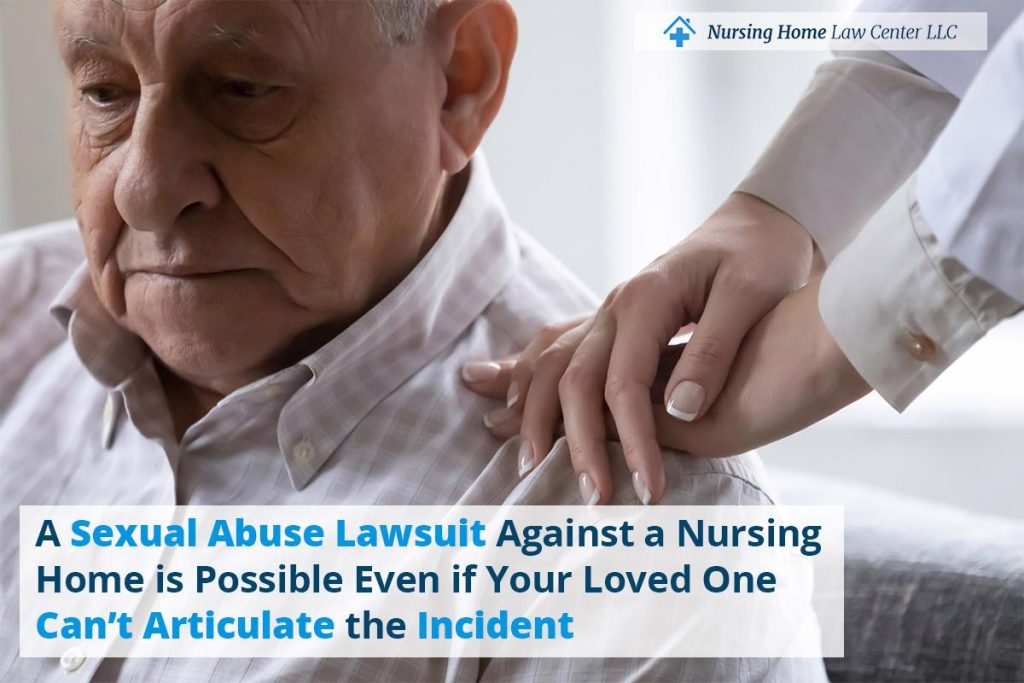
Holding Nursing Homes Accountable for Elder Abuse
Nursing and residential homes have a legal responsibility to protect their residents from harm, including elderly sexual abuse. When they fail to do so, they can be held legally accountable for their negligence. Several failings can be used to prove a residential home’s liability, including:
- Failure to screen staff: If the facility hired or retained employees with a history of abuse in nursing roles or other criminal behavior.
- Lack of supervision: In cases where there was inadequate supervision, either of the staff or residents with a known propensity for aggression.
- Failure to report: If the residential home failed to report suspected abuse to the proper authorities.
- Negligent hiring practices: Not performing thorough background checks on employees.
- Lack of staff training: If employees are not trained to recognize or prevent sexual abuse, the facility can be held liable for neglect.
Depending on the circumstances, other parties, such as individual staff members or even fellow residents, can also be held responsible. Your attorney will conduct a thorough investigation to determine all liable parties.
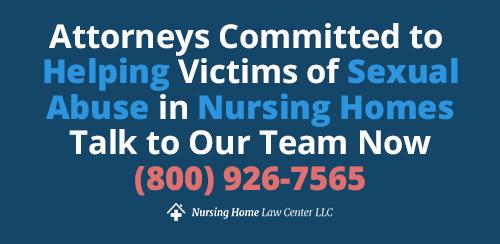
Types of Compensation for Sexually Abused Nursing Home Residents
Victims of elderly sexual abuse in nursing homes are entitled to various forms of compensation. These damages can be classified into two primary categories: Economic and non-economic.
Economic
These cover the tangible financial losses suffered by the victim or their family, including:
- Relocation costs: The relocation expenses may be recoverable if the victim needs to move to a new facility for safety reasons.
- Loss of income or benefits: In some cases, the victim or their family may lose financial support as a result of the abuse.
Non-Economic
These cover the intangible, emotional, and psychological toll that sexual abuse in nursing homes takes on the victim, including pain and suffering, emotional distress, and the loss of the ability to feel joy.
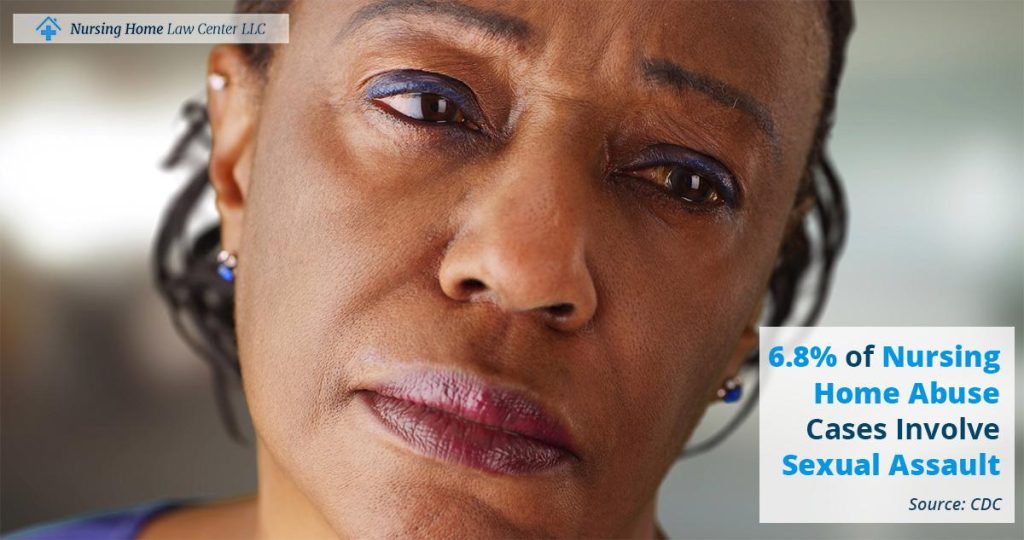
Statute of Limitations for Elder Sexual Abuse Cases
The statute of limitations for filing a claim related to nursing home sexual abuse typically ranges from two to four years from the date of the abuse or the discovery of the abuse. However, there are nuances to the law that may affect how much time you have to file a sexual abuse claim.
What Federal Nursing Home Abuse Laws May Impact Your Case?
Several federal laws have been enacted to protect older adults and disabled individuals in nursing homes, ensuring their safety, dignity, and legal rights. These regulations, given below, establish care standards, require abuse reporting, and provide enforcement mechanisms to hold facilities accountable.
- Nursing Home Reform Act (NHRA) of 1987 – Establishes minimum care standards for federally funded nursing homes, ensuring residents are free from abuse, neglect, and exploitation.
- Elder Justice Act (EJA) of 2010 – Requires mandatory reporting of elder abuse in long-term care facilities and imposes penalties for failure to report.
- Older Americans Act (OAA) – Funds Long-Term Care Ombudsman programs to investigate complaints and protect the rights and dignity of elderly residents.
- Federal Nursing Home Resident Bill of Rights – Guarantees residents of nursing homes the right to quality care, dignity, and the ability to file grievances without retaliation.
- Social Security Act – Section 1919 – Mandates state inspections of Medicaid/Medicare-funded nursing homes to enforce federal safety and care standards.
- Americans with Disabilities Act (ADA) – Prohibits discrimination against residents with disabilities and ensures equal access to care and facility accommodations.
- Civil Rights of Institutionalized Persons Act (CRIPA) – Grants the U.S. Department of Justice authority to investigate nursing home mistreatment and enforce legal protections for residents.
Speaking with a nursing home abuse lawyer as soon as possible ensures your case is filed within the legal time frame.
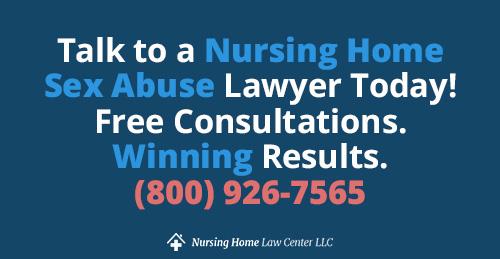
Secure Expert Legal Representation!
If you suspect that someone you love has suffered from sexual abuse in nursing homes, you don’t have to face this difficult situation alone. At the Nursing Home Law Center, we understand the complexity and emotional strain of sexual abuse cases.
We are here to offer compassionate, expert guidance and will work tirelessly to ensure your loved one receives the justice they deserve.
Use our online form or call (888)-926-7565 to explore your legal options during a free consultation.
Common Nursing Home Injuries

